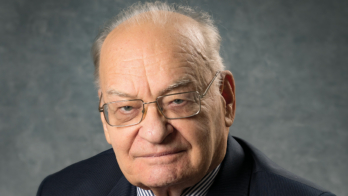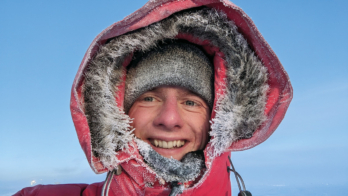Theoretical cosmologist by training, CERN alumna Valeria Pettorino became increasingly interested in data analysis and worked on the Euclid and Planck missions before her project- management skills led her to be appointed a director of research at the French CEA.

Like many physicists, Valeria Pettorino’s fascination with science started when she was a child. Her uncle, a physicist himself, played a major role by sharing his passion for science fiction, strings and extra dimensions. She studied physics and obtained her PhD from the University of Naples in 2005, followed by a postdoc at the University of Torino and then SISSA in Italy. In 2012 her path took her to the University of Geneva and a Marie Curie Fellowship, where she worked with theorist Martin Kunz from UNIGE/CERN – a mentor and role model ever since.
Visiting CERN was an invaluable experience that led to lifelong connections. “Meeting people who worked on particle-physics missions always piqued my interest, as they had such interesting stories and experiences to share,” Valeria explains. “I collaborated and worked alongside people from different areas in cosmology and particle physics, and I got the opportunity to connect with scientists working in different experiments.”
After the fellowship, Valeria went to the University of Heidelberg as a research group leader, and during this time she was selected for the “Science to Data Science” programme by the AI software company Pivigo. Working on artificial intelligence and unsupervised learning to analyse healthcare data for a start-up company in London, it presented her with the opportunity to widen her skillset.
Valeria’s career trajectory turned towards space science in 2007, when she began working for the Euclid mission of the European Space Agency (ESA) due to launch this year, with the aim to measure the geometry of the universe for the study of dark matter and energy. Currently co-lead of the Euclid theory science working group, Valeria has held a number of roles in the mission, including deputy manager of the communication group. In 2018 she became the CEA representative for Euclid–France communication and is currently director of research for the CEA astrophysics department/CosmoStat lab. She also worked on data analysis for ESA’s Planck mission from 2009 to 2018.
Mentoring and networking
In both research collaborations, Valeria worked on numerous projects that she coordinated from start to finish. While leading teams, she studied management with the goal of enabling everyone to reach their full potential. She also completed training in science diplomacy, which helped her gain valuable transferrable skills. “I decided to be proactive in developing my knowledge and started attending webinars, and then training on science diplomacy. I wanted to deepen my understanding on how science can have an impact on the world and society.” In 2022 Valeria was selected to participate in the first Science Diplomacy Immersion Programme organised by the Geneva Science and Diplomacy Anticipator (GESDA), which aims to take advantage of the ecosystem of international organisations in Geneva to anticipate, accelerate and translate emerging scientific themes into concrete actions.
I wanted to deepen my understanding on how science can have an impact on the world and society
Sharing experience and building connections between people have been a theme in Valeria’s career. Nowhere is this better illustrated than her role, since 2015, as a mentor for the Supernova Foundation – a worldwide mentoring and networking programme for women in physics. “Networking is very important in any career path and having the opportunity to encounter people from a diverse range of backgrounds allows you to grow your network both personally and professionally. The mentoring programme is open to all career levels. There are no barriers. It is a global network of people from 53 countries and there are approximately 300 women in the programme. I am convinced that it is a growing community that will continue to thrive.” Valeria has also acted as mentor for Femmes & Science (a French initiative by Paris-Saclay University) in 2021–2022, and was recently appointed as one of 100 mentors worldwide for #space4women, an initiative of the United Nations Office of Outer Space Affairs to support women pursuing studies in space science.
A member of the CERN Alumni Network, Valeria thoroughly enjoys staying connected with CERN. “Not only is the CERN Alumni Network excellent for CERN as it brings together a wide range of people from many career paths, but it also provides an opportunity for its members to understand and learn how science can be used outside of academia.”





